TV’s back baby! These times are strange and trying for everyone, but have no fear, we’ve awoken from our slumber to guide you through the treacherous landscape of original content that the small screen provides. Big swings! Out-of-the-park hits! Mortifying misses! Oh, what an exciting time to be alive!
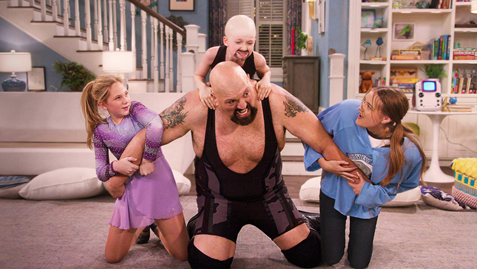
THE BIG SHOW SHOW (Netflix)
Netflix has decided the answer to their Disney competition is a family sitcom designed around WWE superstar Big Show. I am deadly serious. THE BIG SHOW SHOW follows Big Show, a retired WWE star, as he raises his three daughters with his wife, while his daughter from a previous marriage adjusts to life in Florida with her new family. On the surface, THE BIG SHOW SHOW is a safe family sitcom, in many ways hearkening back to an early ‘90s “TGIF” programming block, a time when a television show built around an existing incongruous personality wasn’t out of the ordinary. Big Show (Paul Wight) stands out as a charming dad trying to do the best for his family. The show has a similar tone and look to many of the sitcoms on Disney Channel like GOOD LUCK CHARLIE or THAT’S SO RAVEN. In fact, THE BIG SHOW SHOW feels like it’s trying to be like a Disney Channel sitcom, but for Netflix, with the “edge” and “looseness” that comes with that association. Despite the look, the show frequently bears its teeth at the House of Mouse. In the first episode alone, there are two Disney callouts. The first one comes from one of Big Show’s daughters saying that ABC television is something only old people watch. The second is when Big Show’s wife, Cassy (Allison Munn), says she hates children from Orlando and blames Disney World for their behavior. THE BIG SHOW SHOW is a fun, if easy romp that’s great for a wide audience, with some nice slapstick and physical humor. But call this writer a conspirator, because I feel Netflix sees this show as more than just wholesome fun for the whole family, or at the least that the creators of the show are very aware of how they’re positioning themselves, and that might be the most interesting thing of all. [Wyatt Lemoine]
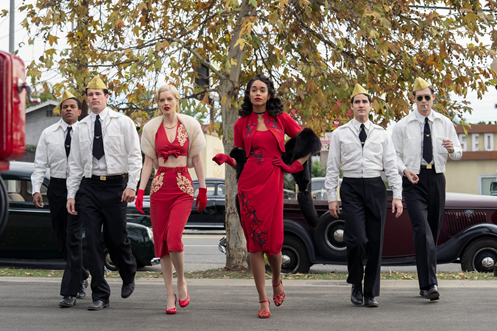
HOLLYWOOD (Netflix)
Ryan Murphy believes that movies can change the world. In his interview with Salon, he wonders what his life would have been like “if there were someone on the screen who looked like me.” If eight-year-old Ryan Murphy looked up at the movie screen and saw someone who “looked like” him—white, rich, male, and possessing the very tangible, physical trait of gayness—his life could have been different. Would he really have wanted it to turn out differently? I see him as some sort of genius, really; Murphy has elevated himself beyond the realm of criticism by sprinkling in naught-dimensional roles for people of color and women in his works, while the real interest remains on the people who look like him: white, rich, male, and… gay.
Much of HOLLYWOOD details the lives of tortured producers, actors, and talent managers who are unable to live out their lives without fear of persecution. One of them seems close enough to Murphy himself: the brave gay producer who puts his career and life on the line to make a movie called Meg, Hollywood’s first movie starring a woman of color. The conceit of HOLLYWOOD is much like the other recent HOLLYWOOD… in that both filmmakers want happy endings for their characters. Murphy haphazardly tosses real historical figures like Anna May Wong and Hattie McDaniel into his series, actresses scorned by Hollywood and relegated to the sidelines by virtue of their being racial minorities. In Murphy’s extravagant, anything-goes fantasyland, Wong is awarded the highest honor a person can possibly receive—an Oscar—and McDaniel, unlike in 1940, gets to… be in the crowd for the Oscars.
HOLLYWOOD’s message is a strange one. Civil rights cannot be brought about by agitation, protest, or strikes by ordinary people. Respect for one’s identity can only be garnered by making movies. Eleanor Roosevelt shows up in the fifth episode and is tasked with delivering the non-self-aware version of the quote at the start of TALLADEGA NIGHTS: THE BALLAD OF RICKY BOBBY. The former First Lady sits in a boardroom across three studio heads. She says: “I used to believe that good government could change the world. I don’t know that I believe that anymore. However, what you do—the three of you—can change the world.”
At a certain point watching HOLLYWOOD, your brain breaks. The idiotic plot, the despicable characters, the comical lack of conflict, the imagery of burning crosses flippantly deployed during a cold open montage and never referenced again, the stupid, the fucking stupid idea that movies are the law, movies dictate what is acceptable, movies are progress, movies save lives, movies stop wars, movies advance society, Eleanor Roosevelt saying government doesn’t work but movies do—at a certain point, your neurons stop firing, the synapses freeze, you go cold. And damn it, Ryan Murphy wouldn’t want it any other way. [Luka Stojcic]
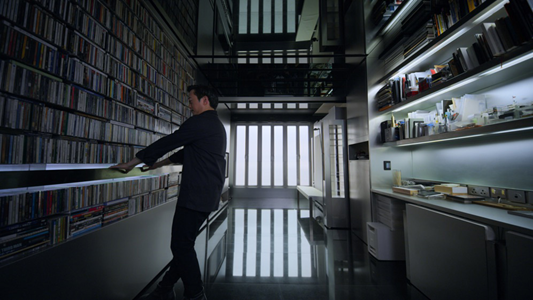
HOME (Apple TV+)
I’m obsessed with houses. I’ve never admitted this to anyone, but I love them. People don’t realize how much their house can reflect who they are. It’s like a secret layer of a person, part of the “costume” they put on to live their day-to-day life. The color of the exterior could show how they want to be seen by strangers and the interior design shows the secrets they hold or what makes them comfortable. It’s been a long time since I’ve seen a new house given the current circumstances, but I was finally able to get my fill with the new Apple TV+ show HOME.
HOME is a documentary series that’s advertised as showing the most extraordinary houses in the world. The show follows people who have built some unique houses, from a house inside a greenhouse in the hopes of allowing the builder’s family to always be surrounded by greenery and fresh fruit, to someone expanding the small space of their apartment to make it feel much larger. What makes HOME different from the shows on HGTV is that it focuses just as much on the homeowner as it does on the home. The series dives into the details of why the owner designed their house the way they did and how they did it. The stories behind the house somehow make the houses seem even more extraordinary, highlighting how the houses really are an expression of the psychology of their designer or their tenants. While other home-improvement shows are chaotic and manic sprints through tearing down a house and fixing up residences, HOME follows a soothing tour through a lovely-looking dwelling and the people or families whose experiences shaped the design. HOME successfully awes its audience while engaging them with the stories of the homeowners, and personally, it was very refreshing to see something new outside my own home. On this show, Apple TV+ hits a HOME-run! [Wyatt Lemoine]
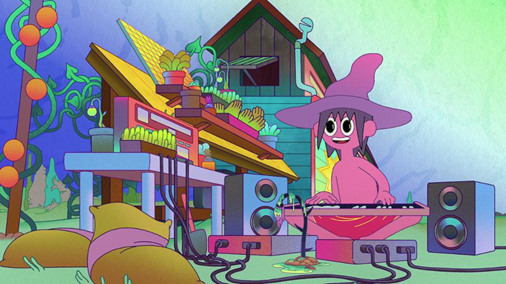
THE MIDNIGHT GOSPEL (Netflix)
Sure, everyone you know is probably trying to start a podcast because they think that they have the most hilarious conversations with their friends and they’re stuck inside, but do you know any friends who will start a space podcast? THE MIDNIGHT GOSPEL, an adult animation show on Netflix, follows Clancy, a “spacecaster” who goes to different “dying” planets to talk to their citizens for his podcast. The show is the latest project from Pendleton Ward, creator of ADVENTURE TIME, and comedian Duncan Trussell. With THE MIDNIGHT GOSPEL, Ward continues to create zany worlds with hypnotic animation and Trussel brings his brand of philosophical pondering to a wider audience, providing the podcast source material (DUNCAN TRUSSELL’S FAMILY HOUR) for this unique show.
THE MIDNIGHT GOSPEL is both unique and soothing. It brings the pleasures of listening to a podcast, but with the joy of watching detailed and absurd cartoons. It’s impressive how Ward and the writers are able to create a world and story around the podcast recordings happening in each episode and how those casual and candid conversations can make forsuch a stark contrast with the wild animated action happening in the background. For example, in the first episode, Clancy (Duncan Trussell) visits an alternate Earth ravaged by a zombie apocalypse but spends most of his time there talking about the pros and cons of drug use. The character of Clancy is also unique and different each episode, changing shape and character design to fit the conversation and “world” that’s being visited. Because of its preference to not shy away from heavier themes, the show feels similar to RICK AND MORTY, except trading dark humor, pessimism, and nihilism for something more relaxing and relatable (and only occasionally pessimistic). It’s interesting how THE MIDNIGHT GOSPEL is on Netflix, one of the more top-tier examples of the streamer edging into ADULT SWIM territory. There isn’t anything else like it on Netflix, but hopefully it points to a whole new style of show for the company. [Wyatt Lemoine]
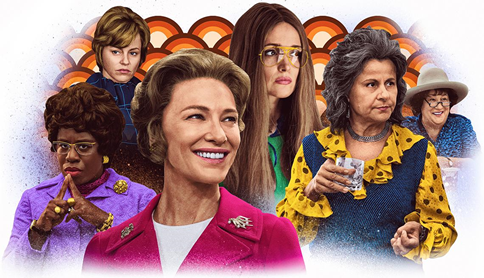
MRS. AMERICA (Hulu)
FX’s MRS. AMERICA is less of a show about the ERA and more of an episodic group of interconnected biopics, and I mean that as a compliment. I can’t say I’m completely blown away, but it does a lot of things very well, and I’ve had a genuinely good time watching it so far. MRS. AMERICA is fun: it’s stylized, the theme song bangs, the clothes are rad, and the soundtrack has sent me down a thoroughly enjoyable ‘70s rabbit hole. It’s not a series looking to be an educational program (the show goes out of its way to address this with a title card before every episode), but it does get most of the big picture events right and there are plenty of historical tidbits I was happy to see included. Breaking down something as broad as ‘the ratification of the equal rights amendment’’ into its individual players and events is a pretty big ask, but MRS. AMERICA tackles it by zeroing in on the women themselves and showing them, warts and all, as women trying to do what they think is right—and it makes for a much better TV show (and with a cast this good, it really would have been a waste not to).
Most episodes are centered around and titled after one of the main feminist activists working to get the ERA ratified: Gloria Steinem, Shirley Christholm, Betty Friedan, Brenda Feigan-Fasteau, Jill Ruckelshaus, and Bella Abzug, intercut with the opposition as led by conservative activist Phyllis Schlafley, whose titular episode kicks off the series. It’s also Cate Blanchett’s Schlafly that is occasionally my least favorite part of the series, simply because there are only so many scenes that essentially boil down to “sometimes conservative women are negatively affected by the sexism they enable, and isn’t that tragic” that I can reasonably be expected to watch in 2020, no matter how well-acted and written. I don’t think the show is asking anyone to feel sorry for Schlafly, and there’s plenty of merit in having her around as the show’s villain, but by the fourth or fifth episode I started wishing some of that screentime was reallocated to the other characters, or even that the series was structured without a solo lead character.
And truly, there is plenty of conflict to be found within the pro-ERA movement. The show’s portrayal of Betty Friedan, famed author of The Feminine Mystique, really strives to show us all sides of the infamously brash activist. The fourth episode features a real debate that took place between Schlafly and Friedan that culminates in Friedan losing her temper—something several people explicitly warned her not to do. It also shows her a little too drunk on a date, wearing a dress she wore years earlier for a television appearance, a reminder of how big a star she used to be contrasted with her life now, being constantly left out of the loop. Maybe she’s just someone who wrote a book 10 years ago, maybe she’s too homophobic to deserve her place in history, maybe she’s more trouble than she’s worth, maybe there’s a way to appreciate her contributions despite all of that—MRS. AMERICA lets you decide, and shows that these are questions worth asking.
It’s the depictions of the pro-ERA movement’s strategy talks and office meetings that have become my favorite part of the series so far. I very much appreciate MRS. AMERICA’s vested interest in letting women be women, and letting me watch scenes where characters routinely bounce between political strategy discussions and making jokes about coleslaw. You know, girl talk. There is something lovely and endearing about seeing these iconic women act like I know women to act, about watching Gloria Steinmen dancing alone in her apartment to The Kinks and taking naps on her office sofa and changing her mind and realizing her mistakes and limitations as an activist. I don’t think I expected to use the word “endearing” to refer to a show about the equal rights amendment, but that’s what I’m going with and that’s what makes it a solid recommendation. And with two episodes to go, I imagine MRS. AMERICA will stick the landing. [Teresa Zarmer]
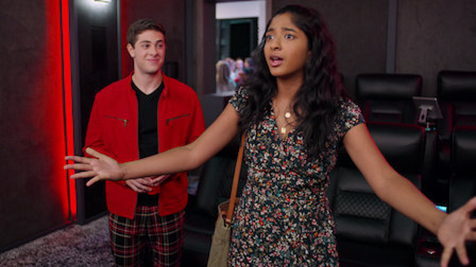
NEVER HAVE I EVER (Netflix)
As the years have gone on, Netflix has focused more and more on their teenage audience. It seems like every week they have a new high school movie or TV show, and it’s honestly refreshing. High school is more-or-less a universal experience, with a variety of points of view to cover and cliches to lean into or subvert. High school can be distilled down to a series of labels, the awkward process of maturing, or any other variety of combinations. The new show on Netflix, NEVER HAVE I EVER, continues Netflix’s hot streak of fun high school programming, but from a familiar comedic voice.
NEVER HAVE I EVER is Mindy Kaling’s newest project, and it’s just as funny and entertaining as her previous projects like THE MINDY PROJECT, or even her early work on THE OFFICE. The show follows Devi Vishwakumar, a sophomore high school student who lost her father and become a nerdy outcast in her first year of high school, now determined to make her second year the best year ever. We follow Devi as she deals with the angst and hormones of being a teenager, while having to balance her family’s Indian culture as a teenager in America. Maitreyi Ramakrishnan plays Devi and is absolutely the breakout star of the show. Ramakrishnan is hilarious and easily able to sell all the awkwardness that comes with being a high school student. Each episode finds Devi dealing with a different situation such as boys, friendship, mourning, and the insecurity her beautiful cousin causes her. NEVER HAVE I EVER fits perfectly with a lot of the teen-focused programming on Netflix, while still being fun for people who’ve long ago left high school behind. [Wyatt Lemoine]
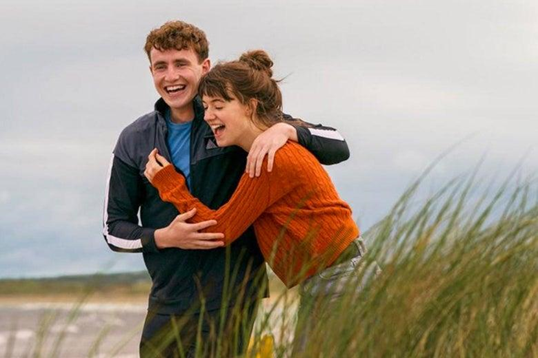
NORMAL PEOPLE (Hulu)
The trouble with a lot of teen dramas is that they tend to forget that teenager’s lives can have the same depth and emotional complexity as adults. Luckily, Sally Rooney’s NORMAL PEOPLE respects its characters and its audience enough to take teenage infatuation seriously, and to portray the pains of being in love for the first time with staggering honesty. The first half of the series, directed by Lenny Abrahamson (of ROOM fame) is achingly intimate, shot in Abrahamson’s signature style of extreme close-ups that make you feel trapped in a snowglobe with his subjects. Daisy Edgar-Jones plays Marianne, a depressed and thoroughly unpopular high school senior from a well-to-do Irish family, who finds herself rapidly falling in love with Connell (Paul Mescal), the son of her maid and star rugby player. Connell is ultimately cruel to Marianne, but in a way that all careless teenage boys can be. For a show of such emotional intensity, NORMAL PEOPLE excels at never indulging in melodrama or broad soap opera gestures. A lifetime of complex feelings can pass between Marianne and Connell within a few short scenes, making the show feel rich and dense, despite each episode only being 30 minutes. Some may find the understated approach tedious, but for those willing to stick it out, the moments of dramatic crescendo are second-to-none.
What makes NORMAL PEOPLE a particular revelation is how smoothly it tracks Marianne and Connell’s relationship beyond high school, after their love has fractured and they reconnect as “adults” in college. In a brief passage of time, their dynamic is completely upended; it’s such a sharp and accurate portrayal of how much can change in the few months after high school at the beginning of college. Mescal and Edgar-Jones really get a chance to thrive in these scenes and transform themselves; the subtle changes they both make to their expressions and body language to demonstrate how much they’ve transformed are a masterclass in acting and direction on Abrahmson’s part. In all, NORMAL PEOPLE is a treat, a gentle and deep story we rarely get to share. [Carter Moon]
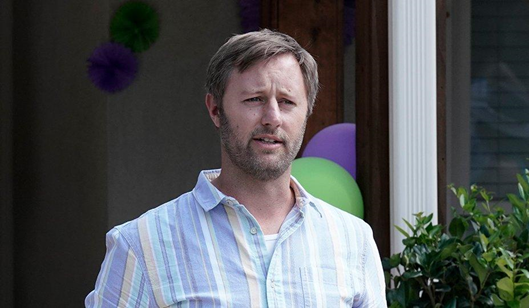
ROBBIE (Comedy Central)
Morality, as it applies to characters in sitcoms, has only grown blurrier as the years go on. If SEINFELD seemed like a revelation in the ‘90s, IT’S ALWAYS SUNNY IN PHILADELPHIA was (and is) a full-blown revolution. And in the years since both shows have left their respective cultural imprints, the lessons to be learned have only grown. Those teachings weigh pretty heavily on ROBBIE, Comedy Central’s Rory Scovel-led comedy that, buried on the channel’s YouTube feed, feels like a cross between a COVID-19 casualty and a low-stakes online-only experiment. The cast is absolute dynamite, well-recognized journeymen character actors who each make ROBBIE more than a worthwhile look at, among them Beau Bridges, Sasheer Zamata, and Mary Holland, each bright spots in the show’s eight-episode run. And certainly a plot centered around a Christian basketball league in the South couldn’t be more perfectly tailored to Scovel’s particular brand of comedy. Unfortunately, ROBBIE’s titular character makes the show a rough watch. Like the amoral characters of shows like A.P. BIO, ARRESTED DEVELOPMENT, THE MICK, or literally countless others over the last 10 years, ROBBIE attempts to find the complicated balance between despicable characters justifying bad behavior and regularly comes up short.
Scovel and the show’s creators seem to lack the understanding that what makes those aforementioned shows tick is that the comeuppance naturally outweighs the intention; for the most part, characters in these types of comedies find themselves back at square one by the end of an episode, having perhaps learned nothing, but at the very least seeing that the universe is meant to provide a balance to bad behavior. That is, of course, not how the world works, but it’s nonetheless disappointing that ROBBIE ultimately feels like a cringefest of bad faith decision making, Robbie himself making bad choices he either doubles down on or suffers through with no lessons learned. “Robbie vs. Rooney,” an early episode in the S1 run, finds Scovel’s character actively rallying the town around attacking the high school’s new men’s basketball coach because she’s a woman; it’s a moral decision the show acknowledges is wrong while still attempting to comedically justify Robbie’s attacks even though he also knows it’s wrong. Robbie’s ability to see things as reprehensible while also actively choosing not to course-correct becomes not just distracting, but the show’s downfall. His energy is clearly meant to play as chaotic, something Scovel excels at, but it lacks the goofiness to play as fun.
While the final episodes of the season do grow into themselves, that is only because Robbie’s decision making feels naturally less weighty, his tunnel-visioned goal to become the high school basketball coach (which is ROBBIE’s overarching storyline) diluted as the show goes on. ROBBIE still finds laughs—Holland in particular is absolutely a joy as a not-all-together-unhinged Southern bartender, a role it feels like she’s been playing in the halls of UCB and on podcasts her whole life. And Scovel’s deadpanned delivery of such wild ignorance is clearly a good linchpin to build around. But ultimately ROBBIE lives and dies by how gross you feel watching the main character fail upwards. For me, it was a rougher-than-not watch. [CJ Simonson]
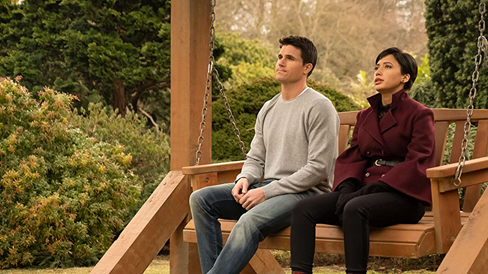
UPLOAD (Amazon Video)
The existential dread of life and death has inspired some good comedies in the last few years, the most popular being NBC’s THE GOOD PLACE. The newest show to tackle this topic is Amazon Prime’s UPLOAD. UPLOAD, created by Greg Daniels, of THE OFFICE and KING OF THE HILL fame, is about an afterlife where dead people’s consciousnesses are uploaded to a server hosting a simulated “paradise” where they get to live out the rest of their life as they see fit. The show follows Nathan Brown, a 27-year-old programmer who dies in a car accident, and his guide in his new digital world, Nora Anthony.
While UPLOAD brings a moderate amount of laughs, its real strength is in the story and the world it builds to tell it. An interesting subplot of the show follows Nora, an employee at Horizon, the company that owns the afterlife server, as she tries to convince her father of the merits of uploading his consciousness to the server. He refuses because he still believes in heaven. While UPLOAD seems similar to THE GOOD PLACE in its desire to plumb human philosophy, it uses technology to touch on a wider variety of subjects. For example, UPLOAD focuses on the pervasive monetization of every aspect of technology. In the digital afterlife, if someone wants a higher-end brand of coffee or a tastier snack, they have to pay money from a linked bank account of a living relative. UPLOAD’s greatest strength is its refusal to forget that the problems of its premise go far beyond tradition or belief in the case of Nora’s father and reach well into real annoyances we deal with today as the tech industry grows more powerful. When it comes to life and death, UPLOAD brings some fun jokes and an even more thought-provoking story to contain them. [Wyatt Lemoine]



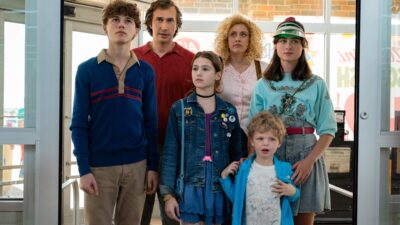
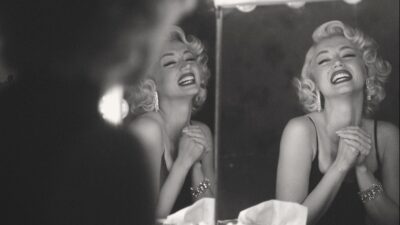

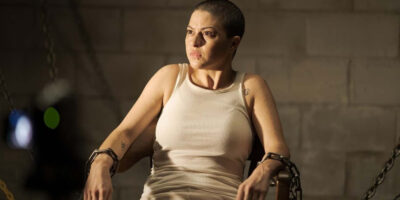



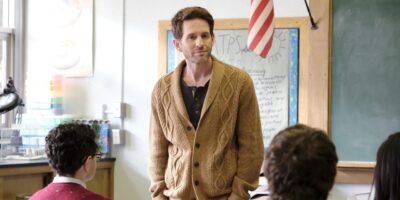
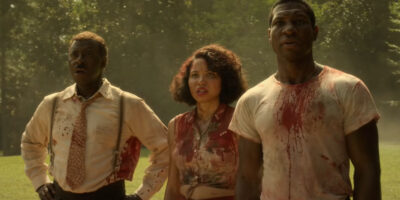




Comments